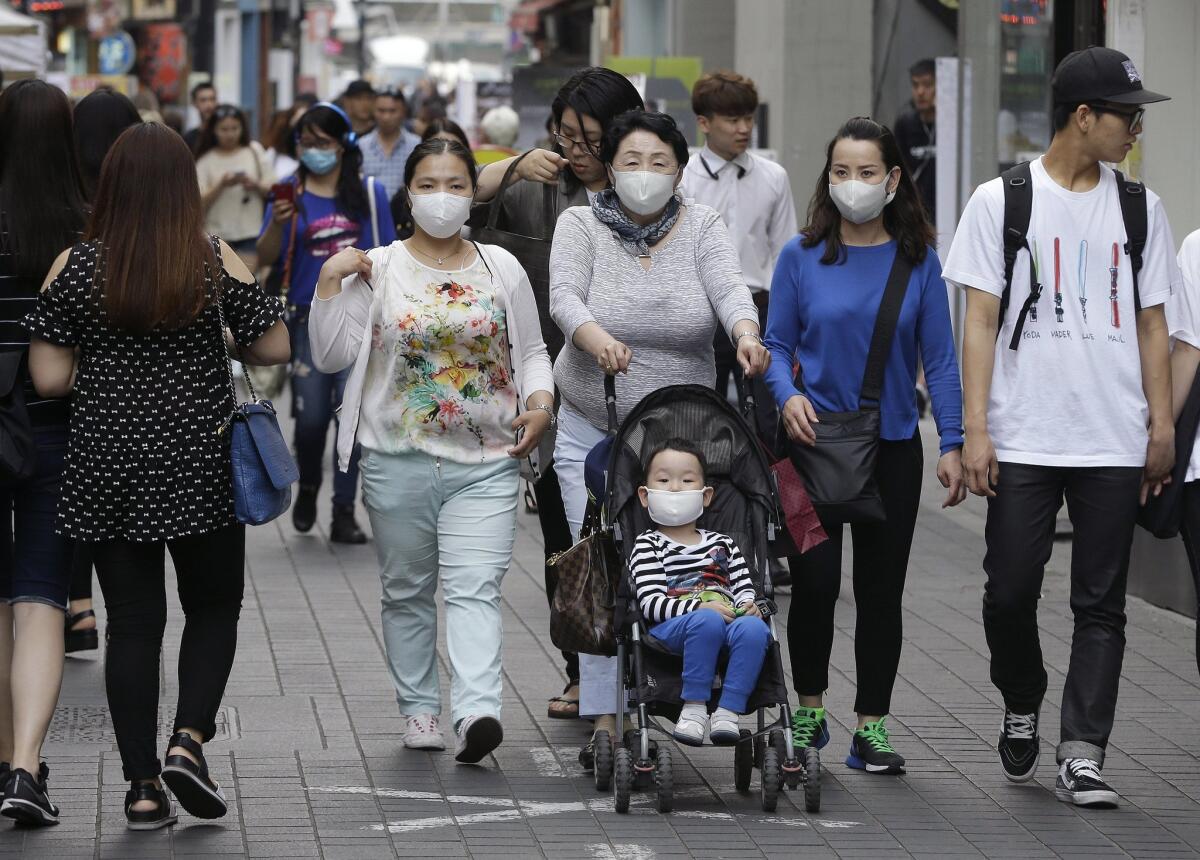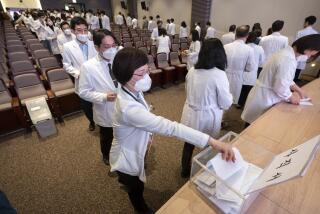South Korea officials say a sixth person has died from MERS virus

Visitors to a shopping district in Seoul wear masks. Many people in the city have taken to wearing particulate-filtering masks as a precaution against Middle East respiratory syndrome.
- Share via
Reporting from Seoul — Normally on a warm spring evening, with a gentle breeze and temperatures in the low 80s, Han River Park in Seoul would be packed with picnicking families and couples out for a stroll.
But on Monday the park was nearly empty as many South Koreans avoid public places because of an outbreak of Middle East respiratory syndrome, or MERS, a potentially fatal virus for which there is no vaccine or cure.
South Korea announced during the day a sixth death from MERS, as well as 23 new infections, which brought the total to 87. The number of cases has increased gradually since the first was reported in South Korea on May 20.
Fears over MERS have led nearly 2,000 schools to close and a range of public events to be canceled to reduce the risk of the disease spreading.
But not everyone is afraid, and some South Koreans are even taking advantage of unusually quiet public spaces.
“MERS is actually the reason we came here today -- normally it’s almost impossible to find somewhere to sit,” said college student Yoo Hee-won, seated on the grass as she shared ice cream with three friends. “Today it’s way more peaceful than usual.”
Yoo and her friends say they aren’t worried about MERS because they’re young and healthy, and that they didn’t feel any need to don one of the particulate-filtering masks many in Seoul are now wearing in public.
“I think people are overreacting a bit,” said Hah Jun-ho, one of her companions.
Throughout the outbreak, the government has faced some criticism for possibly making public anxiety worse by withholding information about the outbreak, particularly which hospitals had treated MERS patients. Officials argued that releasing the names and locations of the facilities would create panic in those neighborhoods.
On Sunday, the government decided to reveal the names of all 24 hospitals that had treated or diagnosed MERS patients. The names of five more were added Monday when the new infections were announced.
Officials also announced that they would assign public servants to monitor people who are under quarantine and suspected patients’ will have their cellphone signals monitored to ensure that they remain at home.
MERS was first reported in 2012 and has infected more than 1,100 people worldwide and caused more than 440 deaths, mostly in the Middle East, according to the World Health Organization. The government has said that all infected people in South Korea had some contact with an infected person, usually at a hospital.
At Han River Park on most summer days, independent merchants, mostly middle-aged women, do a brisk trade selling snacks and cold drinks. But business was slow on Monday, said Kim Soon-ja, 53, who operates a stall serving grilled chicken skewers.
“There aren’t many people today, but still I have to come and work,” Kim said.
The South Korean government has expressed concern that the MERS outbreak could hurt the economy. At a meeting of business leaders on Monday, Finance Minister Choi Kyung-hwan said that MERS “could hurt consumption and business investment,” reported Yonhap News Agency.
“Everything possible is being done to contain the spread of MERS,” he added, “with efforts being made to check its impact on the economy and come up with countermeasures to limit fallout.”
Tourism is one sector that could be particularly hard hit if the outbreak drags on. Hong Kong and the United Arab Emirates have advised their citizens to avoid travel to South Korea. The Korea Tourism Organization told Yonhap on Sunday that more than 20,000 overseas travelers have canceled trips to the country.
A June 5 post on the website of the science journal Nature argued that the MERS outbreak is not a global threat. The article noted that the virus does not spread easily between humans and that South Korean authorities are keeping the outbreak largely contained by tracing and monitoring infected people.
Borowiec is a special correspondent.
More to Read
Sign up for Essential California
The most important California stories and recommendations in your inbox every morning.
You may occasionally receive promotional content from the Los Angeles Times.













